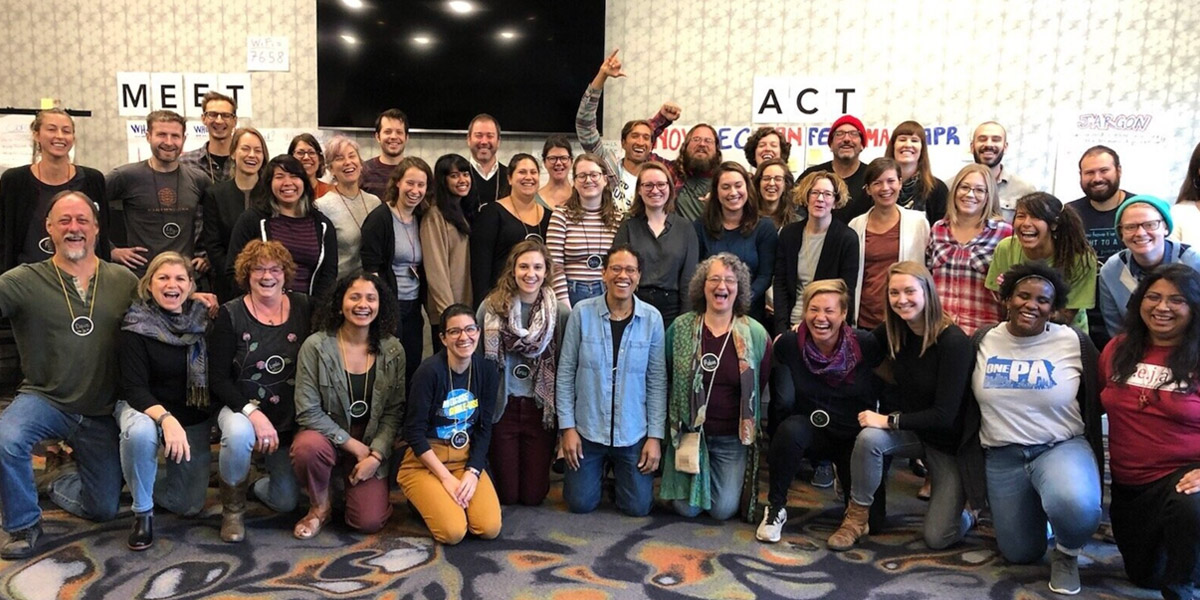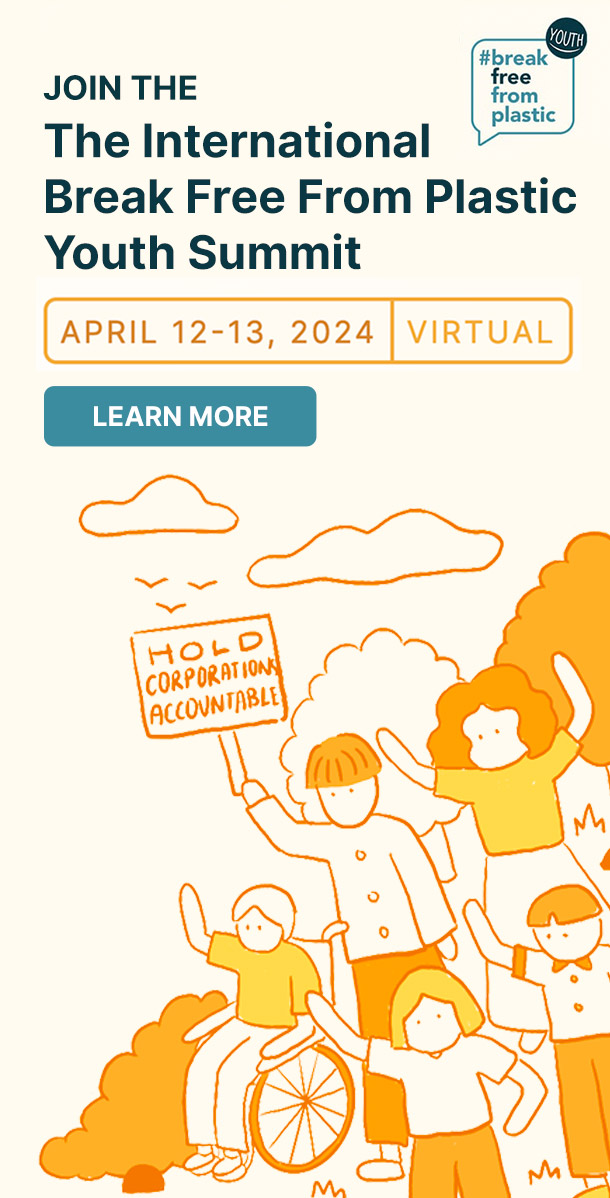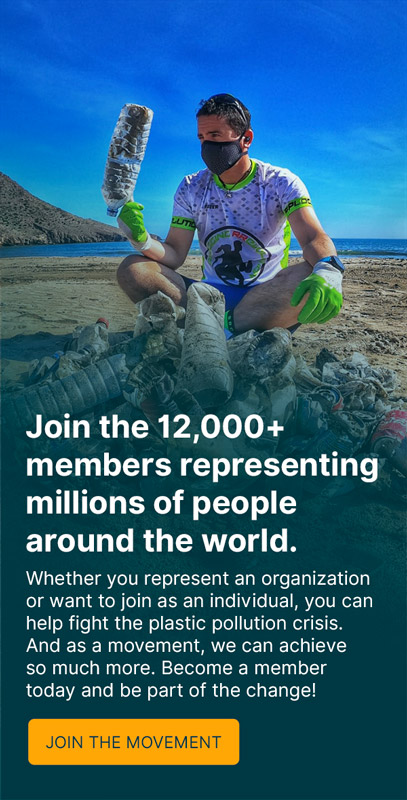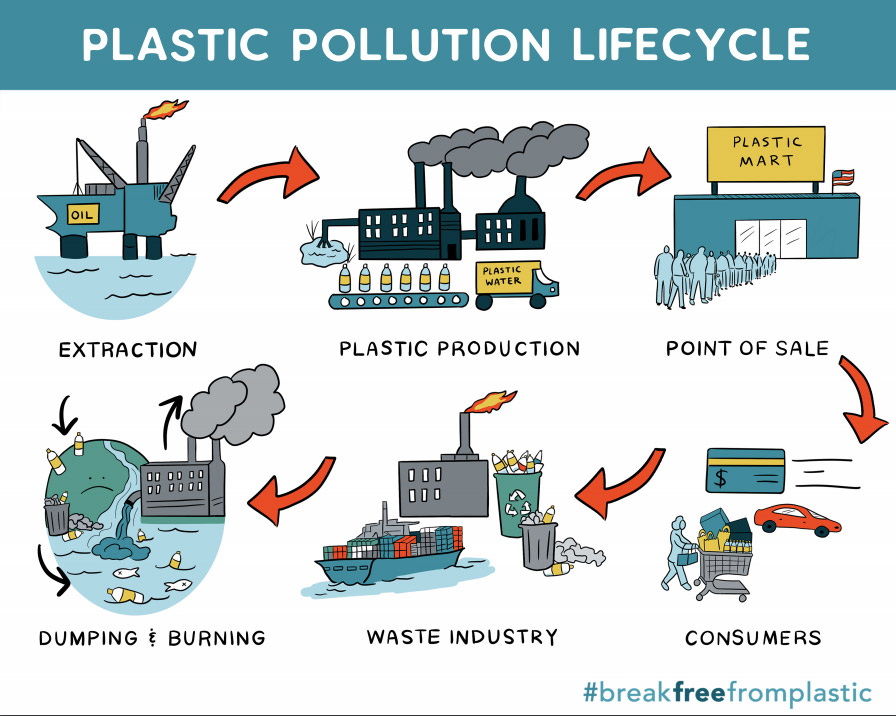
Break Free From Plastic is a global movement with regional chapters partnered across the plastics supply chain
Diane Wilson, San Antonio Bay Estuarine Waterkeeper, Seadrift, Texas:
“In 2016 a small ragtag team of Waterkeeper volunteers began collecting evidence on Lavaca Bay of illegally discharged pellets and powder from Formosa Plastics, a 2500 acre plastic giant located in Point Comfort, Texas. Four years later the small group won a record-breaking lawsuit and settlement of $50 Million with all monies going to local environmental projects and the promise of zero discharge of all plastic pollution from the ‘serial offender’ Formosa Plastics.”
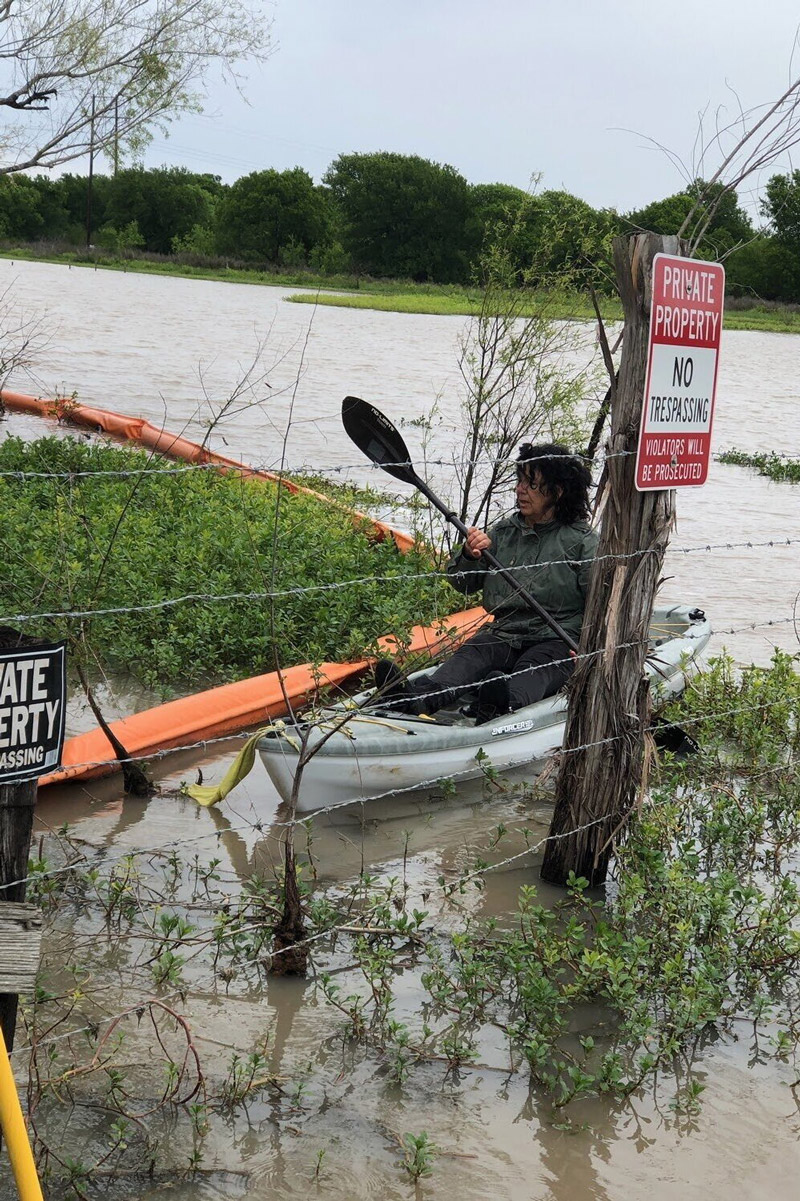
Diane Wilson collecting plastic pellets for research
Young Grguras, Post-landfill Action Network, Philadelphia:
“This year PLAN (The Post-Landfill Action Network) brought on its first staff member dedicated fully to plastic free schools and had two college campuses sign onto our Campus Pledge: The College of the Atlantic and Eckerd College. We are so excited that these schools have made commitments, and are eager to organize alongside the forty-plus colleges also working on this campaign. In the new year, we are also looking forward to our Beyond Waste Summits, and working on our solidarity for the international plastic free campus movement.”
Diego Jimenez, Lonely Whale, Seattle, Washington:
“Thanks to the incredible support of our collaborators, Lonely Whale launched Question How You Hydrate, a new campaign that is waking the world up to the problem of our reliance on single-use plastic water bottles and empowering consumers to choose and champion more sustainable alternatives. Sparking a conversation about single-use plastic water bottles and their role in the global plastic pollution crisis, the campaign is driving action through strategic collaborations with NGOs, celebrities and social media influencers in addition to global institutions. Through these strategic collaborations, Question How You Hydrate has already reached more than 50 countries, empowered legislators to publicly call for action, introduced an alternative to single-use plastic water bottles, encouraged corporate campuses to stop using single-use plastic water bottles in their offices and launched the Museum of Plastic. The Lonely Whale team is excited for continued collaboration across all global BFFP members to inspire further actions that support a mass culture shift away from single-use plastics.”
Claire Arkin, GAIA, Berkeley, California:
“Thanks to the incredible persistence of our membe
rs in Southeast Asia and BFFP partners in the United States and around the world, we were able to shine a light on how the global plastic waste trade enables wealthy nations like the U.S. to dump their plastic problem onto other countries, primarily in the Global South. GAIA released an investigative report uncovering how this problem was impacting communities on the ground, and soon after a group of BFFP members descended upon the UN meeting demanding greater transparency and accountability for the global plastic waste trade. The ratification of the Norway Amendment-- a step forward in this fight to stop this global injustice--is proof that BFFP members are a powerful force when we unite across borders.”
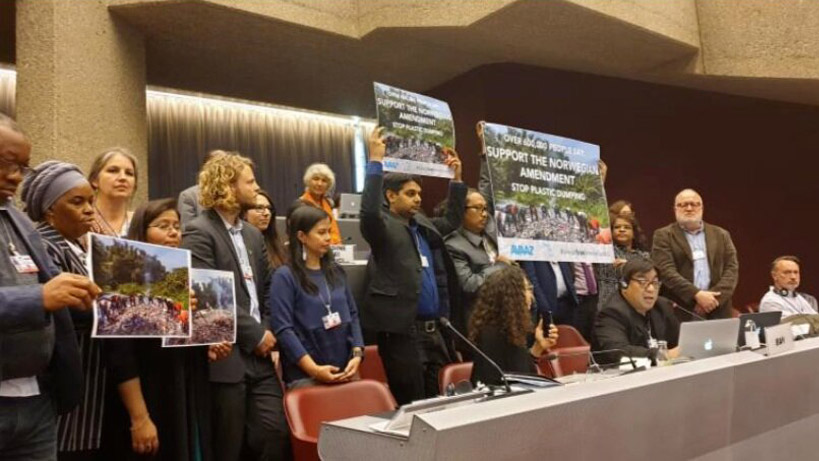
GAIA members working to ratify the Norway Amendment
Emily DiFrisco, Plastic Pollution Coalition, Chicago, Illinois:
“Plastic Pollution Coalition organized a digital campaign to pressure Amazon.com to reduce their plastic footprint on the earth. Thousands of people and organizations Tweeted at Amazon.com and more than 5,300 people signed the petition, illustrating the power of organizations joining forces. Our voices are louder together. We look forward to working together with BFFP members to shift corporate practices in the year ahead.”
Eve Fox, Beyond Plastics, Bennington, Vermont:
“Beyond Plastics has had a busy and exciting first year! Highlights include helping to pass the nation’s most far-reaching (so far) single-use plastic pollution law in the state of Vermont - the final was very similar to our model Plastics Trifecta legislation that bans single-use straws, polystyrene foam and bags in one fell swoop. Vermont Governor Phil Scott signed it into law in mid-June. We also managed to pass the Plastics Trifecta (officially known as the Plastic-Free Hudson River Act in the city of Troy, New York in September. We are also proud to be leading the charge in opposing the misnamed “Save Our Seas Act 2.0” in Congress by forming a coalition of over 100 organizations, delivering a sign-on letter to Senators signed by these groups, generating grassroots activist phone calls and emails to Senate offices, highlighting the bill’s shortcomings with members of the media, and working directly with Senate legislative staffers to educate them about the realities of plastic pollution and the limitations and risks inherent in this piece of legislation. We continue to call for a meaningful bill that will effectively reduce plastic pollution rather than industry-endorsed greenwash.”
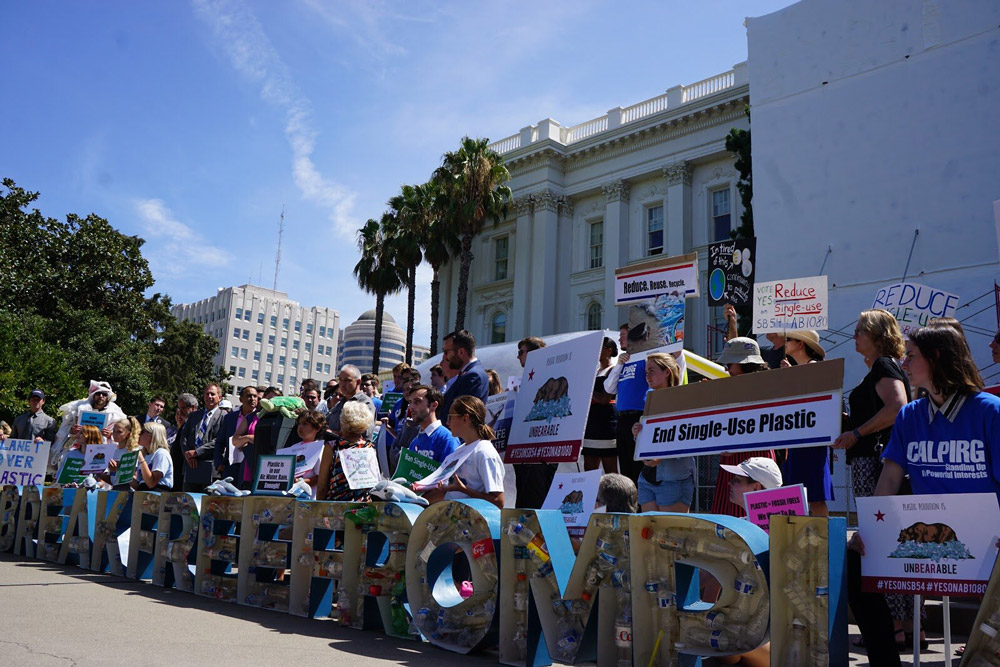
Break Free From Plastic members in Sacramento, CA
Sam Pearse, The Story of Stuff Project, Berkeley, California:
“After the movement's success in passing the EU's groundbreaking Plastics Directive in late 2017, The Story of Stuff Project worked with partners in California to bring ambitious legislation to the US -- raising the bar to meet the true scale of the plastics crisis. The level of support across the state to pass this legislation has been such that our movement was within earshot of passing the Circular Economy and Plastic Pollution Reduction Act just nine months later. Thanks to the unprecedented efforts of groups across the state, we now have an opportunity to deliver the landmark legislation in early 2020.”
Mike Schade, Mind the Store Campaign Director, Safer Chemicals Healthy Families, Brooklyn, New York:
“The Mind the Store campaign challenges the largest retailers to eliminate toxic chemicals in products and packaging and develop comprehensive safer chemical policies. To protect families, communities, and workers, we are working to transform the marketplace and drive a competitive race to the top. Over the past year, in response to the campaign, a growing universe of retailers have launched policies to reduce and eliminate toxic chemicals in plastics and other consumer products. For example, for the first time ever, major retail grocers and restaurants are focused on eliminating classes of toxic chemicals, such as per- and poly-fluoroalkyl substances (PFAS), ortho-phthalates and bisphenols from food packaging materials, which have been found to be a source of exposure to harmful contaminants. A number of retailers launched safer chemicals policies including Ahold Delhaize, Lowe’s, Sephora, and Staples, targeting harmful chemicals for action in plastics and other products.”
Jacqueline Omania, 5th-grade teacher and Oxford Heirs to Our Oceans Chapter Leader, Berkeley, California:
“Oxford Heirs to Our Oceans, a student group of elementary school activists, was successful in helping to pass Berkeley’s Disposable Free Dining Ordinance in January 2019. These passionate students have been compared to the local versions of Greta Thunberg as their speeches expose the truth behind plastic “recycling” and the urgency to move to reusables for the sake of our precious environment. Their experiences reaching near-zero waste in their classroom remind us that simple small actions do matter. Their efforts garnered the Oxford Heirs the Sierra Club’s Emerging Voices Award; their acceptance speeches focused on the need to address plastic pollution now for their generation and those to come. The Heirs are currently on the streets documenting the rollout of the new law by interviewing customers and business owners regarding the Vessel reusable cup program.”
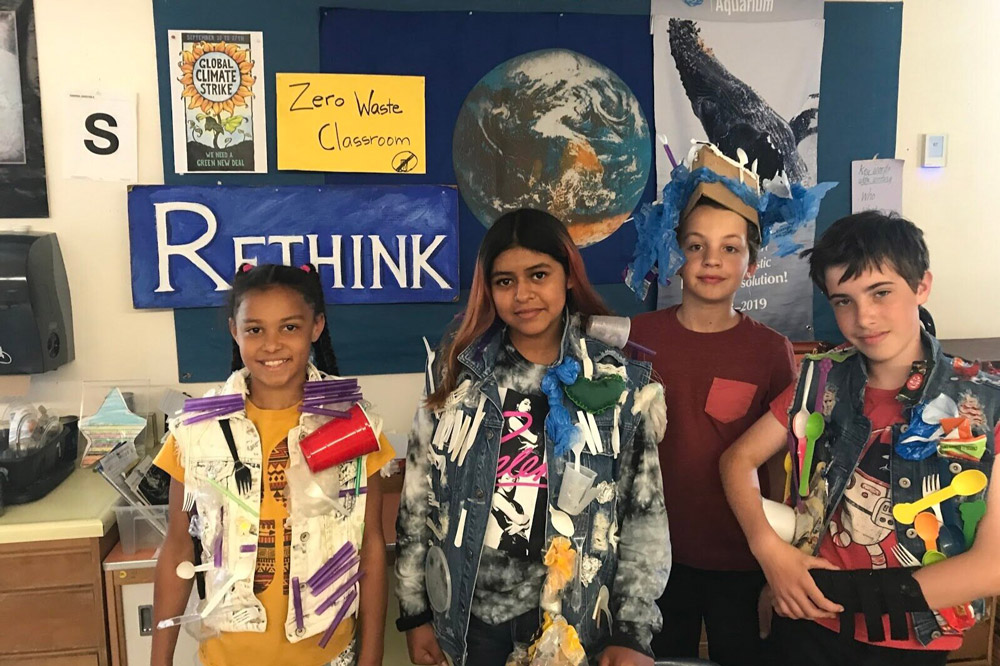
Oxford Heirs to Our Oceans student leaders
“I don't just believe that this ordinance was the right choice, but I know that it will change the way we live now and in the future. This law could lead to California to become a Zero Waste state. This could be the beginning of saying Goodbye to plastic FOREVER.” - Fiona Groth Reidy, age 11, Berkeley, California.
Lauren, UPSTREAM Communications & Outreach Coordinator, Portland, Maine:
“2019 has been a historic year for local governments to #breakfreefromplastic and take the trash out of our dining experience, thanks to UPSTREAM's leadership in building Indisposable Communities! Kicking off the year with the unanimously passed Disposable-Free Berkeley ordinance in CA, UPSTREAM has since launched the National Reuse Network to spark innovative solutions across the SF Bay region, Los Angeles, New York City, Seattle, Boston and communities in between and beyond. Learn more about the momentous success in Berkeley as featured on the Indisposable Podcast, and check out how this model ordinance helps solve single-use plastic pollution on UPSTREAM's video here!”
Katie Allen, Executive Director, Algalita Marine Research and Education, Long Beach, California:
“Algalita turned 25 this year! We celebrated with a special expedition to the North Pacific gyre in partnership with the Korean Broadcasting System, who produced a plastic pollution documentary that was broadcasted to millions of households across South Korea. Also in 2019, we hosted our 9th annual International Youth Summit on Plastic Pollution - an event that supported 24 action campaigns across eight countries. We directly trained 623 educators on how to integrate plastic pollution curriculum into their classrooms and helped lead phase one of a district-wide transition to zero waste schools in Long Beach, CA. Our zero waste retail outpost, BYO at Algalita, reached over 18,000 product refills in 2019!”
Marie Mekosh, Center for International Environmental Law (CIEL), Washington, DC:
“This year, CIEL celebrated the power of what our movement can achieve when we combine our strengths and work together. With partners working across every stage of the plastic lifecycle, we released two groundbreaking reports that exposed how plastic is a human health crisis hiding in plain sight and how plastic production and disposal threatens our global climate. As countries negotiate global solutions to the plastic crisis, CIEL has worked to ensure that they consider and address plastic's impacts at every stage of its lifecycle, including through a petition supported by one million people. And our collective efforts have paid off: In May, 187 countries took a major step forward to control plastic waste dumping under the Basel Convention — a critical victory for communities around the globe working to Break Free From Plastic.”
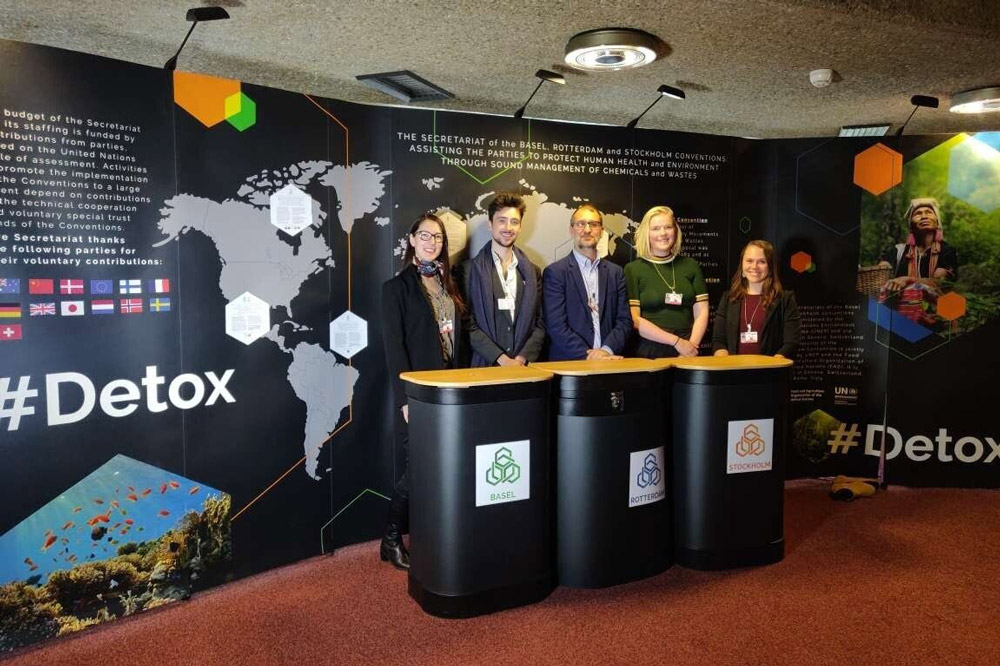
CIEL staff working to control plastic waste dumping at the Basel Convention
Baani Behniwal, Policy Associate, Californians Against Waste, Sacramento, California:
“Plastic pollution was a hot topic in the California Legislature in 2019, with the introduction and near passage of SB 54/AB 1080 - The California Circular Economy and Pollution Reduction Act. These identical bills, aimed at reducing the amount of waste generated from single-use packaging and foodware, made it almost all the way through the legislative process thanks to an unprecedented amount of support from across the environmental community, local governments, businesses, labor unions, and more. With these bills coming up for a final vote at the beginning of the year, as well as a ballot measure in the works for the fall, 2020 is bound to be a monumental year for tackling the plastic crisis in California.”
Marina Ivlev, Director of Communications, 5 Gyres, Los Angeles, California:
"5 Gyres turned 10 in 2019 and celebrated the year with the following projects: TrashBlitz mobilized 25 partner organizations and over 600 Angelenos to collect data across Los Angeles. With our brand new web-based app, we collected robust data on waste type, material, and brand. We found that food and beverage packaging dominated, which confirms our findings from our BAN List 2.0 research! In 2019 our Science Programs Director, Carolynn Box saw the results of her work on a three-year study that found over 7 trillion pieces of microplastics enter the San Francisco Bay each year! 2020 will be an exceptional year with our ambassadors getting a chance to build with one another at the first-ever Ambassador Summit and TrashBlitz expanding to three new cities; Portland, Denver, and Brooklyn!"
Follow along on Facebook, Twitter, and Instagram for more from our members in 2020!

